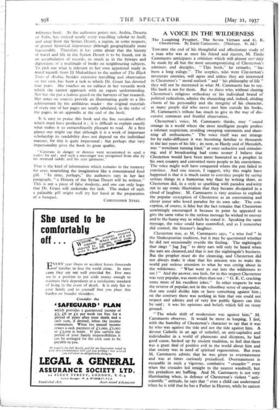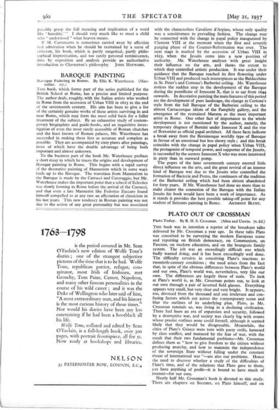.The Laughing Prophet., The Seven Virtues and G. K.
A VOICE. IN THE WILDERNESS
" Cheiteiton. By Emile Canunaerts. (Methuen. 8s. 6d.)
TOWARDS the end of his thoughtful and affectionate study or a man who was at once his friend and master,: M. Emile
Cammaerts anticipates a criticism which will almost cerninly be made by all but the most uncompromising of Chesterton's admirers and disciples. " This book," he remarks, " has been a long eulogy.", The .sceptics, .who were Chesterton's inveterate enemies, will agree and unless they are interested in Chesterton's " moral outlook " and " his philosophy of life " they will not be interested in what M. Cammaerts has to say. His book is not for them. But to . those who, without sharing Chesterton's religious orthodoxy or his individual brand of political radicalism, admire the abounding and, indeed, abiding charm of his personality and the . integrity of his character, as many people did who never, met him outside his books, M. Cammaerts's tribute has much to give in the way of dis- cursive comment and fruitful observation.
Chesterton's voice, M. Cammaerts thinks, may " sound strange in a world where the most intelligent people profess a tolerant scepticism, avoiding sweeping statements and shun- ning all enthusiasms." The voice_ itself _ was not strange for by radio-diffusion it was becothing familiar to thousands in the last years of his life ; its note, as Hardy said of Meredith, was " trenchant turning kind," at once seductive and stimulat- ing, and if broadcasting had come sooner I believe that Chesterton would have been more honoured as a prophet in his own country and converted-more people to his convictions. The voice might well have conquered where .the pen failed to convince. And one reason, I suggest, why this might have happened is that it is much easier to convince people by saving serious things in a humorous way -than by writing them, as Chesterton did, in a style so sparkling with paradox and witty not to say comic illustration that they became dissipated in a cloud of laughter. M. Cammaerts is very anxious to explode the popular conception of Chesterton as an entertaining and clever jester who loved paradox for its own sake. The con- ception, of course, is false but the fact remains that Chesterton unwittingly encouraged it because in print he appeared to give the same value to the serious message he wished to convey and to the funny way in which he stated it. Speaking the same message, the voice could have controlled, and as I remember did control, the listener's laughter.
Chesterton was, as M. Cammaerts says, " a wise fool " in the Shakespearian tradition, but it may be questioned whether he did not occasionally overdo the fooling. The nightingale that sings " Jug Jug " to dirty ears will only be heard when • the ears are cleansed, and that is not the nightingale's business. .But the prophet must do the cleansing, and Chesterton did not always make it clear that his mission was to make the world pay serious attention to what he was crying about in the wilderness. " What went ye out into the wilderness to see ? " And the answer, one feels, for in this respect Chesterton was very popular, was more often than not : " G. K. C. cracking some more of his excellent jokes." In other respects he was the reverse of popular, not in the schoolboy sense of unpopular, that one could dislike him or have something against him ; on the contrary there was nothing in him that one could not respect and admire and of very few public figures can this be said ; it was his opinions and beliefs which fell on stony giound.
" The whole drift of modernism was against him," M. Canunaerts observes. It would be more in keeping, I fed, with the humility of Chesterton's character to say that it was he who was against the tide and not the tide against him. A devout Catholic in an age of unbelief, an anti-capitalist and individualist in a world of plutocrats and dictators, he had good cause, backed up by ancient tradition, to feel that there was a great deal of positive evil in the world about him and that society was in need of spiritual regeneration. But even M. Cammaerts admits that he was given to overstatement and was at times curiously prejudiced. Overstatement is excusable in such a vigorous, combative " crusader " even when the crusades led straight to the nearest windmill, but the prejudices are baffling. And M. Carninaerts is not very illuminating when, in defence of Chesterton's violent " anti- scientific " attitude, he says that_" even a child can understand when he is told that he has a Father in Heaven, while he cannot possibly grasp the full meaning and implication of a word like ' heredity.' " I should very much like to meet a child who " understood " what heaven means. If M. Cammaerts is sometimes carried away by affection and admiration when he should be restrained by a sense of criticism, his book, which is partly exegetical, partly plulo- sophical improvisation, and too rarely personal reminiscence, does by exposition and analysis provide an authoritative introduction to Chesterton's philosophy. JOHN HAYWARD.















































 Previous page
Previous page